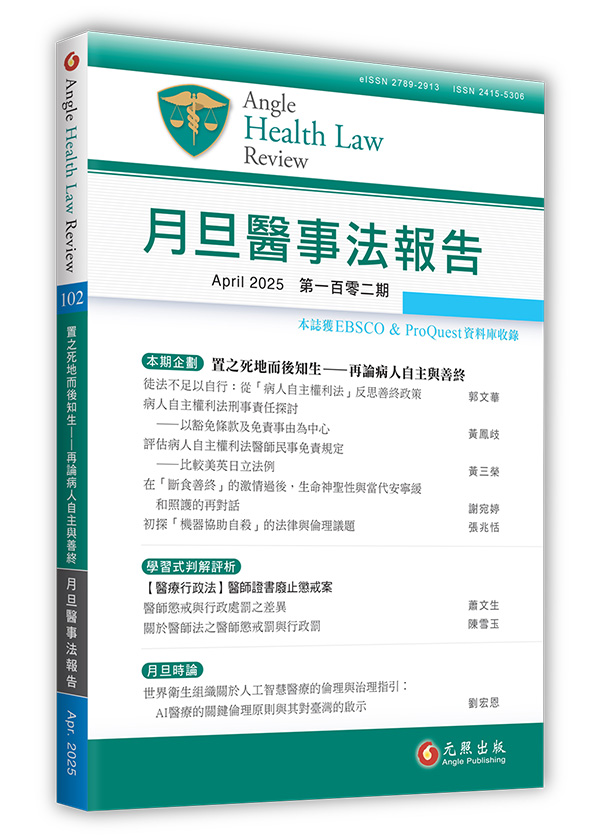世界衛生組織關於人工智慧醫療的倫理與治理指引︰AI醫療的關鍵倫理原則與其對臺灣的啟示【月旦時論】 試閱
A Study of the WHO Guidance on the Ethics and Governance of Artificial Intelligence for Health: Key Ethical Principles of AI for Health and Their Enlightenment to Taiwan
人工智慧(AI)在醫療領域的快速發展,普遍被認為將會對醫學與臨床醫療照護帶來許多改變。但AI醫療也引發了傷害風險、偏見、可能違反平等、不透明、難以究責等倫理、法律和社會方面的許多爭議及問題。如何使它既能夠促進公共利益,又能夠減輕潛在危害和意外後果,並取得社會信賴與支持使用,便成為AI醫療發展時無論是業者、醫療人員或是政府主管機關都需要認真加以考慮並試圖解決的挑戰。針對這些問題,世界衛生組織(WHO)發布的「人工智慧醫療倫理與治理指引」是目前國際上關於AI醫療的倫理與治理,最具完整性也是最具權威性的指導文件。WHO指出︰要充分發揮AI醫療的益處,就必須正面直視並設法解決它的倫理挑戰。倫理考量和人權思考並不是在AI醫療技術先發展出來之後,才需要考量的事項,而是一開始就應該把它視為AI醫療的設計、開發和部署使用的核心問題。本文深入分析並舉例評釋WHO本指引所提出的,AI醫療相關人員皆應遵循、政府主管機關於治理時應考量的六項關鍵倫理指導原則。本文並指出︰我國政府於推動AI醫療時似乎沒有足夠重視WHO此一指引,並至今尚未參考其指導原則訂定我國的AI醫療倫理與治理指引,這可能使臺灣的AI醫療產業發展仍缺乏指導性的遊戲規則而平添相關業者與人員的不確定性,並有國際接軌問題,實應儘速訂定。
The rapid development of artificial intelligence (AI) in the medical field is generally believed to bring many changes to medicine and clinical care. However, AI in medicine has also raised many ethical, legal and social issues and problems, such as the risk of harm, bias, possible violations of equality, lack of transparency, and difficulties in accountability. How to enable it to promote the public interest while mitigating potential hazards and unintended consequences, and gain the trust and support of society to use it, has become a challenge that needs to be seriously considered and attempted to be solved by both industry and medical personnel or government authorities in the development of AI for health. In response to these issues, the “Guidance on the Ethics and Governance of Artificial Intelligence for Health” issued by the World Health Organization (WHO) is currently the most complete and authoritative international guidance document on the ethics and governance of AI in healthcare. The WHO points out that ethical considerations and human rights thinking are not matters that need to be considered after AI for health is first developed, but should be considered from the beginning as core issues in the design, development and deployment of AI for health. This article provides an in-depth analysis and examples to explain the six key ethical guiding principles set out in the WHO guidance that should be followed by those involved in AI for health and considered by government authorities in governance. This article also points out that: it seems that the Taiwanese government has not attached sufficient importance to this WHO guidance when promoting AI in healthcare, and has not yet formulated its own ethical and governance guidance for AI in healthcare with reference to the WHO’s guiding principles. This may result in the development of Taiwan’s AI medical industry still lacking guiding rules of the game, which will add uncertainty for related businesses and personnel, and may cause problems with international integration. A Taiwanese guidance on the ethics and governance of AI for health should be formulated as soon as possible.
108-134






